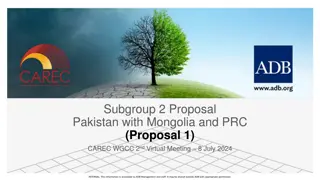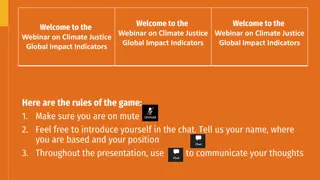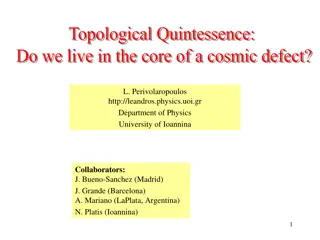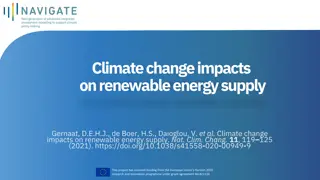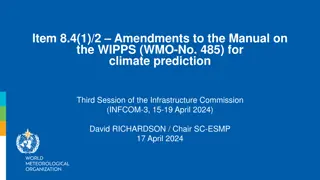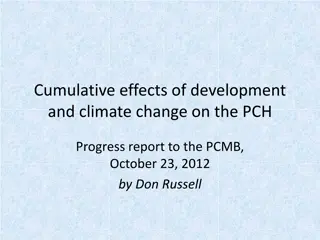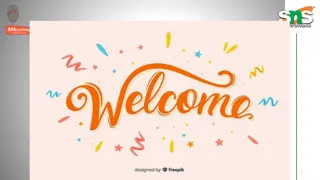Future Directions in Climate Reporting: Key Questions and Scenarios
Paper from Plenary-1 explores key questions on the benefits of global/regional reports, uniqueness of WMO, IPCC, & BAMS reports, data management, impact communication, attribution, uncertainties, and positive information sharing. Deliverable 2 outlines scenarios optimizing report overlap, proposing digital hubs, policy briefs for COP, and streamlined reporting structures to enhance climate information dissemination.
Download Presentation

Please find below an Image/Link to download the presentation.
The content on the website is provided AS IS for your information and personal use only. It may not be sold, licensed, or shared on other websites without obtaining consent from the author.If you encounter any issues during the download, it is possible that the publisher has removed the file from their server.
You are allowed to download the files provided on this website for personal or commercial use, subject to the condition that they are used lawfully. All files are the property of their respective owners.
The content on the website is provided AS IS for your information and personal use only. It may not be sold, licensed, or shared on other websites without obtaining consent from the author.
E N D
Presentation Transcript
Outcome from Plenary-1 Deliverable 1: Paper raising fundamental questions such as on the benefit of continuing the current scheme of global and regional reports. 11 key overarching questions have been identified 1) What is the benefit of continuing the current scheme of global/regional reports? 2) What makes WMO, IPCC & BAMS different? What makes our report unique? 3) How do we make use of existing initiatives to communicate climate information to COP authoritatively and unambiguously (especially considering harmonizing methodologies and including other papers on sea level/carbon budget, IGCC, IPCC etc.) ? 4) How to navigate 1.5 / temperature issue? 5) How can we resolve data issues? 6) How to improve the fundamental structure of the reports (provisional, global, and regional)? 7) Who is our actual audience? 8) How to navigate impact information across the reports? 9) Attribution? (Difference between indicators/long term changes filling gap from IPCC and extremes) 10)How can we prepare to report on effectiveness of mitigation/emissions reductions? 11)How to bring in positive information? 12)How to tackle uncertainties? (Calculating & communicating)(Particularly ensuring that numbers are clearly defined in terms of certainty)
Deliverable 2: Scenarios for future directions Optimize the overlap/duplication with United in Science: Both WMO SoGC and UiS reports are annual, science focused reports addressing the policy community Regional State of the Climate Digital Hubs (instead of PDF reports) A single policy brief from across reports to be communicated at COP for policy makers ( maximum 10 pages) to replace the submission of provisional report WMO State of the Global Climate will continue to be produced and published in the 1st Q of the following year, focusing on headline climate indicators and top ( 10?) high impact events
Proposed Future SoC Scenario Maps (temperature, precipitation, sea level, others) Climate indicators dashboard Extreme events -- summaries & impacts Updating regional hubs Regularly updated, accommodating regional specificities & priorities State of the Climate (Y+1) Shortened version focused more on indicators & 5-10 key events United in Science Incorporates annual updates on the SoC to be launched ahead of UNGA COP Climate Update Harmonized document targeted to COP priorities & policy-makers needs State of the Climate Update ET-CMA to contribute text 5 pages - key messages from: Climate Services/United in Science BAMS/IPCC/1.5 ENSO update Resilience indicators/climate action tracking (energy, $) 5 pages: Most relevant climate indicator updates Regional State of Climate Summaries
International Workshop on the Modernisation of the State of the Climate Reporting I- Objectives 1) Bring together key players in the reporting on the State of the Climate 2) Discuss scientific issues and questions that have been raised during the write-shop 3) Promote synergy, co-production and linkages 4) Prospect implementation of emerging methodologies, tools and various data sources Venue Offenbach, Germany, 8-10 July 2024 Expected number of Participants: to be determined: face to face primarily, but consider hybrid option Expected: Outcomes 1- Refinement and agreement of the white papers from this write-shop 2- Recommendations to be submitted to WMO bodies (Executive Council, Regional Associations, Research Board, Policy Advisors) on Scenarios discussed at this write-shop 3- Raise interest on the opportunities to publish papers on questions that need more indepth consideration, in peer- review journals
Discussions General discussions on the objectives and expected outcomes Workshop Structure Who to invite ( Participants), by field of expertise
Thank you. 1.1 Lorem ipsum Lorem Ipsum Lorem Ipsum Lorem Ipsum peria quatures qui quatas son deo dolenitium wmo.int Lorem Ipsum Lorem Ipsum










